#ysealiwla
Text
Walking Through the Highlights of The Wonder Women Summit 2022

On the 26th of November 2022, over 25 young Southeast Asian women leaders, from all around the globe, gathered and concentrated on this year’s Wonder Women Summit 2022, themed ‘strengthening collective wisdom”. This event was also in line with the Observance of International Day for the Elimination of Violence against Women to emphasize and raise awareness on the ‘16 Days of Activism Against Gender-Based Violence. Consisting of YSEALI Women’s Leadership Academy (WLA) alumnae, with the aim to promote knowledge exchange and foster collaboration from various sectors—the Summit saw insightful discussions relevant to women and the community, from ten perspicacious panel speakers in four-panel sessions.
Panel 1 of Wonder Women Summit: Gender Equality Issues and Women Empowerment

Dr. Nadirah Babji, YSEALI WLA Alumna 2021, from Malaysia, highlighted issues on Sexual and Reproductive Health and Rights in Disasters and Crises. She shed light on the challenges women face during times of crises and disasters, particularly the increased risk of sexual violence and discrimination attributed to unaddressed gender inequality during crises/disasters intervention. The lack of gender-responsive funding and intervention, as well as the lack of accessible and sustained sexual reproductive healthcare for women, contributes to the exacerbation of women’s livelihood and quality of life. Advocating for better sexual and reproductive health services is essential and life-saving for women. She underlined the need to have governments and NGOs to be more gender-responsive and sensitive to the context of crises and disaster intervention—as women make up the majority of those affected (approximately 70% of the population) and are likely to die 14 times more in crises/disasters than men. The need to have more women representation among decision-makers in the field is also a crucial step in improving the delivery and outcome of sexual and reproductive health in disasters and crises. This is also relevant in the global effort to eliminate gender-based violence against women.
Qurratu'aini Qayyimah Al-Zelzy, representing Brunei, shared perspectives on Gender and the Environment: Promoting Gender Equality and Equity for a Sustainable Environment. During this panel discussion, Qayyimah highlighted the existing gender inequalities in socio-agro-environmental aspects affecting women’s livelihood. Despite women being the majority and important contributors in the field, women remain at a great disadvantage due to such power imbalances. With land ownership and control that is skewed towards men, it sidelines the significance of women’s role in the development of socio-environmental aspects. Such disproportion enables men to have the upper hand and are more in control of the decisions and actions done in the environmental aspect, including climate change. Discrimination and violence against women can occur in the form of coercive control over women through men’s domination of land ownership. Unequal and insecure rights over land are perpetuated due to legal and social barriers as well as long-standing traditional and cultural norms. Hence, socio-agro-environmental policies and governance need to improve to ensure sustainable ecosystem management, and enable men and women to play equal roles in environmental development and conservation. Qayyimah shares that it can be achieved by understanding gender gaps and addressing barriers through gender mainstreaming, facilitating more gender-equality and equity dialogues, strengthening skills such as knowledge management, and financing access, as well as partnerships that are inclusive in approach. Cherry Yingchi Lu @ Charoenporn Boontaksinaphan, from Thailand, also touched on similar themes of gender inequality and inequity affecting women specific to the area of entrepreneurship during the Summit. Relevant to this, she shared insights from Japanese contexts, particularly the concept of Womenomics—the idea that women's economic advancement is crucial and contributes to economic improvements for the country. Cherry mentioned the effort done in Japan that was encouraged by the Japanese Prime Minister Abe who made ‘Womenomics’ one of the country’s top priorities as female participation in the economy was relatively low in Japan compared to other developed countries. Other than that, Cherry shared her own involvement and initiatives to increase women's empowerment in the entrepreneurial arena; as the founder and co-president of the Keio Women in Business (KWIB), she shared her experiences in the organization’s mission to equip undergraduate women with industrial opportunities, business education, and professional development to support their career aspirations.
Panel 2 of Wonder Women Summit: Youth Engagement

Kesuma Anugerah Yanti, CEO of Borneo Urban Lab and Field Officer of Kalimantan Region for Climate Resilience and Inclusive Cities, from Indonesia, covered important points in the involvement of young people for inclusive empowerment in the community. She shared her professional involvement in two successful projects. Firstly, ‘Mobility;’ means ‘Empowering Ability,’ which aims to support and empower persons with disabilities (PWDs) through training, youth mentoring and personal development, such as through pastry-making businesses. Secondly, the ‘Urban Lotus,’ which is a community-led waste management effort involving 15 youths in Sungai Jungai, a riverbank in the Indonesian community mainly focused on training the youth on good daily household waste management practices. These projects showcased by Kesuma also show how women’s involvement and positive leadership qualities are significant to ensure an empathetic approach to improve inclusivity for people with disabilities (PWDs) and youth, through understanding specific community needs and facilitating positive engagement with PWDs and young people.
Dulce Kiki Lay Soares Pinto, from Timor Leste, is a nurse and a Teaching Assistant at QSI International School of Dili, highlighted the need to engage and empower young people, especially girls, through education. Her professional involvement in providing free teaching to young pupils, such as girls, in vulnerable populations in her community includes reading, writing, and confidence-building. The mission to harness their potential and promote higher-level critical thinking serves as a solid foundation to develop individuals capable of addressing their communities’ issues. Dulce shared that in her work, the hardest challenge was gaining parents’ trust and getting the continuous participation of young people in the community. Through persistence and belief in herself and the purpose of her work, she continuously strived to engage the parents and the youth and has successfully conducted activities with them that created a positive impact. The panel discussions by Kesuma and Dulce showed the crucial importance of engaging youth, especially young girls, to build a strong foundation for better community development. Their efforts highlight the necessity for more inclusive partnerships and engagement with communities, which constitutes understanding community needs and creating and designing community- and youth-led programs.
Panel 3 of Wonder Women Summit: Narratives and the Media

Hoang Ngoc An, a YSEALI WLA Alumna 2022 from Vietnam, raised interesting points in her topic discussion on ‘The Power of Narratives in Social Movement. She explained the importance of using narratives to communicate hardly discussed or controversial topics or issues in communities. She shared the nuanced context of trying to advocate for more open discussions on gender identity matters in the Vietnamese community. She shed light on how marginalized groups such as gender-diverse individuals have their personal narratives that are usually left unheard, misunderstood, and heavily stigmatized. Hoang’s sharing during this Summit gave light on how creative approaches such as art exhibitions and showcases carry great potential in getting unique narratives across to different strata of the community who may not have been open to understanding in the first place. Hoang gave an example of a project in Vietnam such as “The Tenement – where our memories begin,” that was impactful and received positive notes. It allowed people to explore different perspectives in the lives of others, as well as develop empathy and familiarity towards non-binary individuals through the lens of reminiscing childhood experiences.

Sabrina Tamayo, a YSEALI WLA alumna 2022 from the Philippines, discussed the significance of ‘Storytelling in the Age of Social Media’. Sabrina shared helpful skills and actionable tips that were conceived from her own and project experiences in the Philippines. Sabrina shared the Project SMILE, which is a multi-awarded youth-led non-profit organization whose main advocacy is to uplift the lives of neglected and underprivileged Filipinos - one act of kindness at a time. She noted that the success of the NGO’s initiatives was mainly attributed to effective engagement between different stakeholders, including beneficiaries of projects, sponsors, and, most importantly, audiences among public members through online campaigns on social media. She explained that in the initial stages of the project, they faced challenges in establishing themselves as credible source of stories for the audience to learn. They learn to strategize appropriately by shifting the spotlight more on the communities they work with. Project SMILE portrayed the main aspects of their beneficiaries’ struggles and encouraged the social media followers to think critically and get involved meaningfully. Making things memorable and meaningful to the targeted audience by having a clear message, speaking the audience's language, and diversifying content were some of the social media tips she enlisted as crucial steps to effective engagement. Other than that, to ensure the sustainability of projects, she reminded the importance of multiple- approaches to funding projects, namely, continuous fundraising efforts, strategic partnerships as well as grant awards.
Panel 4 of Wonder Women Summit: Insights, Soft Skills, Tips and Tricks
In the last part of the Summit, the theme focused on “Insights, Soft Skills, Tips and Tricks.” Three WLA-YSEALI Alumnae shared on mental wellness, reflections from a YSEALI Professional Fellowship Program, and learning of effective skill sets from other members of communities.

Velda Wong Shu Yi, YSEALI WLA Alumna 2022, from Singapore, discussed mental health matters, particularly setting healthy boundaries in life and at work. The importance of ensuring mental health and wellbeing was underpinned during the panel discussion. Velda also shared simple, practical tips such as the integration of creative arts, particularly incorporating the therapeutic value of music, in day-to-day lives can give meaningful benefit to our mental health. Velda also highlighted the benefits of being close to nature,which helps to regulate our emotional and mental health. Other than that, she gave tips to care for our mental health and wellbeing internally and externally. In the internal, she highlighted the importance of positive self-talk and to pacing ourselves with care. For external aspects, she shared how it’s important to be fluid and adaptable, particularly in team cultures; for example, the importance of walking the talk in setting healthy behaviors and boundaries at work and in life, and lastly to catch growth and development opportunities to sustain our mental health and wellbeing.
Nurainee Jangoe, YSEALI Women's Leadership Academy alumnae 2019 from Thailand, shared her memorable moment and inspiring experiences during her YSEALI Professional Fellows Program 2022, in the theme of Governance and Society. Her visits to the United States were an eye-opening experience that allowed her to get to know the systems and organizations established in helping to better serve communities in the U.S. She highlighted that her visit allowed her to learn closely from experts and prominent figures in the field to understand the process of outreach and representation of specific groups in the American community.
Lastly, Somphone Soukhathammavong, from Laos, a YSEALI Women's Leadership Academy alumna 2019, presented “Learning Effective Skills from Perspectives of Migrant Workers and Women.” It was very interesting to understand the different perceptions and experiences of two different marginalized groups in the Laos context. During the discussion, Somphone shed light on the occupational prospects and challenges of Laos industrial workers who returned from Thailand to Lao PDR. The lack of resources and employment opportunities for migrant workers and women negatively impacts their livelihood. Somphone shares in her discussion that projects focused on enhancing skill-set have the potential and prove to be beneficial for these groups of people. She further explained that 21st-century skills, particularly pertaining to communication skills and collaborative skills, i.e., Information literacy, media literacy, and technology literacy were all relevant to support individuals from migrant workers and women in her community to achieve a better life and job prospects.
Conclusion of the Wonder Women Summit
All in all, this year, the Wonder Women Summit achieved its mission to gather young women to ‘strengthen collective wisdom’ by exploring crucial themes and areas of community development with special attention to issues that are relevant to women by women. The discussions were vital and enriched with information to understand the nuances of gender-based violence, which includes gender disparity issues in health, social, environmental, and economic sectors which is congruent to the observance of the International Day for the Elimination of Violence against Women. It is hoped that efforts in supporting and empowering women around the world will continue for the betterment of communities and our future.

1 note
·
View note
Photo

Episode 31 of The Big Idea will feature Ismi Ariniawati, #YSEALIWLA Alumnae Network country lead for Indonesia and a YSEALI alumna who runs an F&B business called “Kedai IsMe” where she envisions a business that isn’t only all about profit but will also do some public good in Jepara, Indonesia. Watch the interview between USASEAN Spokesperson and Ismi on Thursday, August 5, 2021 at 3 p.m. Jakarta Time (GMT +7): youtube.com/usmission2asean @usmission2asean Reposted from @yseali_official #yseali #usmissiontoasean #asean #us #youth (at U.S. Mission to Asean (USASEAN)) https://www.instagram.com/p/CSG-OfeBT2c/?utm_medium=tumblr
0 notes
Text
#YSEALIWLA Alumnae Network: Wonder Women Series — Dialogue 3: Cherrie D. Atilano
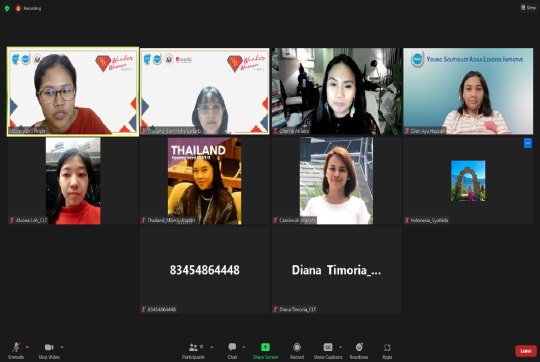
#YSEALIWLA Alumnae Network: Wonder Women Series — Dialogue 3: Cherrie D. Atilano
Start with the question “How we can make their lives better” and follow your passion “It’s not enough to be successful, you should also be relevant”- Cherrie D. Atilano.
On October 16th, 2022, Cherrie D. Atilano, CEO and President of Agrea Agricultural Systems International, shared her feminist icon and passion as an entrepreneur for AGREA.
Recognized by the UN and the World Economic Forum, Cherrie is an ambassador of nutrition and a Filipino farmer who advocates farmer movements toward achieving the SDGs.
Cherrie kicked off the session with her passion and purpose. In addition, she shared some tips about working in the agriculture sector.
Passion and Purpose
When she was a 12-year-old girl, Cherrie was fascinated by the fact that “When you’re poor, 100% of your income goes to food, 10% for rice and 30% for ULAM. But, if you know how to grow your food, you’ll save 30%”.
So, growing up on a sugarcane farm, everyone grew only sugarcane. For 10 months, you will work only 3 months during the planting season for management, and no work for 6 months, then have to work in the last month for harvesting. It means that during those 10 months, people do not work and start to starve, they usually go to the grocery store to buy stuff just to survive.
Since then, she realized the sugarcane issues in the Philippines, started teaching farmers, and took up agriculture.
BIG CHANCE, talents are everywhere, but opportunities and chances are not
In 2014, Cherrie established AGREA, which is innovative to cultivate human beings via sustainable agriculture, fair trade, and a replicable model of an agri-based economy.
AGREA builds the “Ecology of Dignity” for Filipino farmers to be resilient and agents of change. Farmers learn how to grow their food while learning to take care of the environment around them and how their families can be involved.
Cherrie's business started with her passion and purpose; she believes everything should align. Hence, her business goals are zero waste, zero hunger, and zero sufficiency. She is making sure that farmers are wealthy and that children of the farmers are also acknowledged. In the meantime, the business also runs efficiently.
Bring farmers to market, how AGREA responded during the pandemic
When the lockdown happened, Cherrie came up with the innovation: Move Food Initiative (MFI) to support Filipino farmers directly delivering groceries from farms to homes. The solution contributes to reducing food waste, preventing post-harvest loss, and bringing fresh food to front people’s homes.
It’s not easy to teach these farmers to earn a living or get out of poverty because they are busy with their household lives on a daily basis. However, she trusts the power of the farmers to dream of nation-building. Thus, Cherrie started to teach them basic farming to self-gratitude.
Women in agriculture, women can give birth to powerful projects and keep empowering the entire community all the time
During the pandemic, AGREA started urban farms for women and a feeding program for the slums in Manila. As of right now, the program has over 200 women and 5 urban farms. These women work together to feed the communities, they harvest their own food for their families, save meal budgets, and have bonding time with their children.
Agriculture should be smart, cool, and sexy to mobilize youths to be a frontline in making their future brighter
In SEA, farmers are poor, aging, and have low educational attainment, so the whole country is poor. Young people are crucial factors in innovating solutions and sparking change at the root of their future. Hence, Cherrie gives awards to young people to try to encourage them to succeed in different entrepreneurship and empower others to create sustainability in the agriculture system.
Other takeaways from Cherrie
· Position yourself, be knowledgeable about why you are there and learn basic dialects to communicate with stakeholders
· You need to know who are partners you want to work with, delegating who will be responsible for each work and be flexible in business future
· Consumer awareness is crucial in production lines; customers should be aware of food miles and food waste, and try to support local farmers to build sustainability in the food system.
The dialogue session was moderated by YSEALI WLA Alumna Firqin Sumartono; she is the program director of Penawar, a safe community space for women and non-men to commune. She is also the co-founder of a women-led book club focusing on Singapore literature and media.
The event was organized by the Young Southeast Asian Leaders Initiative (YSEALI) Women Alumnae network as the last of three dialogue sessions in the Wonder Women Series. The series features prominent women figures who share their experiences and personal insights on breaking gender barriers in their chosen fields.
The post-event blog was written by YSEALI WLA Alumna Bunthicha Larlarb, a medical technologist and the team leader of UEngage.ASEAN project aims to reduce plastic waste, raise awareness of waste issues, and train youths to become leaders.
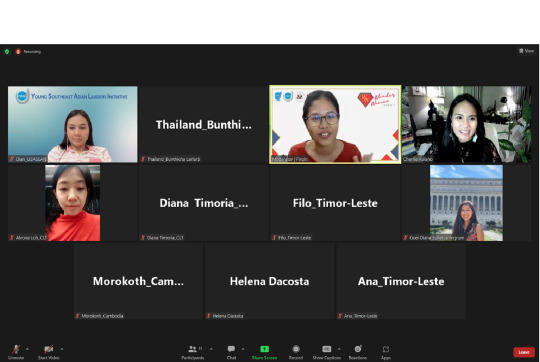
1 note
·
View note
Text
#YSEALIWLA Alumnae Network: Wonder Women Series — Dialogue 2: Rizka Maulida
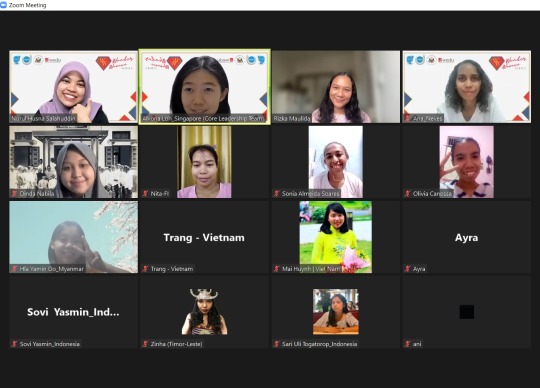
“Moving countries, Be a Woman, and Urban Health”
Over 20 women across Southeast Asia participated in the “Wonder Women Series” Session 2 on September 18th, 2022. Rizka Maulida, a Ph.D. student in the MRC Epidemiology Unit at the University of Cambridge, shared her passion and current research on urban health.
What does it feel like to live across multiple countries your whole life? How do you think the experience will influence you?
For Rizka Maulida, who has lived in Indonesia, the USA, Japan, and now the UK, the experience of moving countries since she was growing up opened her curiosity that there are a lot of different things in the world. As a woman, she also experienced various cultures on how the world treats women differently across the world. Therefore, she encourages women to travel if they have the chance and build friendships all over the world. To note, she acknowledged her privileged background to be able to live in different countries since she was in junior high school.
But, how do you adapt physically and mentally to live across countries?
There are some differences, for example when I grew up in Indonesia, I used to wear a uniform when I went to school, but in the US, a school uniform is not required, just a dress code to follow. I also feel like American culture encourages me to speak my mind more, which I really appreciate, especially when I arrived as a young girl from abroad. I had a different experience when I lived in Japan and even in the UK right now.
Talking about academic things in different countries, what kind of challenges do you face?
Impostor syndrome, feeling like I don’t deserve to be here, is something that I continuously struggle with. But I try to see it from a different perspective. If I am here at Cambridge and I don’t deserve it, doesn’t it mean that the selection committee made a mistake by accepting me? I try to not compare my journey with others, because everyone has a different journey, and conversations with peers have been really helpful for me.
Living across countries also led Rizka to have an interest in health, especially urban health. At first, her interest was strongly in physics and astronomy. However, it started to change when she visited Texas Medical Center, which has not only a hospital but also a research center. That experience was eye-opening to her as a girl to learn that health is not merely medicine but so much more than that.
What led you to urban health?
When I was doing my Master’s Degree, I was interested in dietary or nutritional behavior among adolescents. During my study, I was studying Jakarta, and I realized that urban areas have different issues than rural areas. I realized there are complex urban health problems in Jakarta, like air pollution or limited walkable access, especially compared to other big cities like Tokyo. The same problem also applies to other big cities in Southeast Asia, even though we are progressing in the right direction. Therefore, my background growing up in Jakarta led me to study more about urban health. My research is focusing on country policy regarding city development and its relation to the health of the people. Health is intersectoral and all sectors need to be working together.
Based on your discussion with colleagues from various countries, what effort do you think we should prioritize to achieve public health in Southeast Asia?
It may sound very biased, but I think we need to prioritize urban health. I am really concerned about air pollution in Southeast Asia. There are a lot of infrastructure projects happening, but are they concerned about health in the construction process? There are also more children in these countries than people of older ages. More healthy food options must be available to ensure health among the people.
Is there any disinformation about public health that you wish to dispel?
I want to emphasize that your health is partly your government’s responsibility. The government is also responsible for structural support to ensure we have options and access to be healthy. For example, our access to fresh produce in our neighborhood. A community can also factor in your health, but my point is health is never only the individual’s responsibility.
You mentioned the tendency to have fewer children across the region. To counter that trend, more pressure is put on women to give birth, preferably before 35, to ensure the quality of children. What is your take?
While it is not my expertise, I have a special interest in this issue. It takes a village to raise a child, so I believe in a bigger system to provide women with more flexibility. We need everyone to be involved. For example, daycare, more flexible working hours for parents, and maternal and paternal maternity leave, so support is important.
How do you think the world can better collaborate in preparing for future pandemics, including infectious diseases like Covid or Monkeypox?
This is surprising to me how different countries use different approaches to tackle the pandemic. Right now, in the East, people strictly still need to use masks. It is totally different than in the West. First, I think systematic surveillance needs to be in place. Keep discussing or communicating with other countries. It will be different for every country, but don’t ignore the signal. Pay attention to the cases but also your government’s concern about health facilities. Are they able to cope? If not, how should we prevent these cases? Do we have vaccines? And so on.
There is a growing trend in SEA to use natural supplements, also known as functional food. Why do you think this trend exists?
I am not sure why it is becoming a trend, but there is a big part of being healthy, being physically active, minimizing your trash, eating nutritious food, etc. I think if it is harmless, it is okay. As long as it doesn’t substitute the medicine.
Do you think there is any gender disparity in accessing health in Southeast Asia?
I am not sure, but I think in big cities, there are no disparities between genders, but in rural areas where a son is prioritized over a daughter, maybe yes. What I am concerned about is maternal health among women; probably, it counts as gender disparity because the expectation is for every woman to be able to give birth. But how about equal access to the health facility or if they need support? I noticed that it is still an issue. Women also usually are more alert to find help related to health, compared to men who may neglect the need.
How does your learning in Cambridge enrich your knowledge and skills in urban health?
I have a lot of colleagues from all over the world that definitely have diverse perspectives that may or may not be similar to mine. Here I also deeply realize that health needs to have a structural approach like what I mentioned at the beginning.
Lastly, what is your plan for your future and how will you create an impact?
Firstly, I am affiliated with an institution in Indonesia, where I will be contributing via teaching and research. But, I also want to create research that will be beneficial for the policy-making process. Thus, contributing to many issues. My biggest dream for Indonesia is to build some kind of birth cohort. It is very common in the US and UK, where you follow up with someone from clinical to behavior measurement. It is very important because it is not only one or two years, but it can be ten or even seventy-five years. Because you measure someone in many aspects over time, you can take that as a recommendation for the policy.
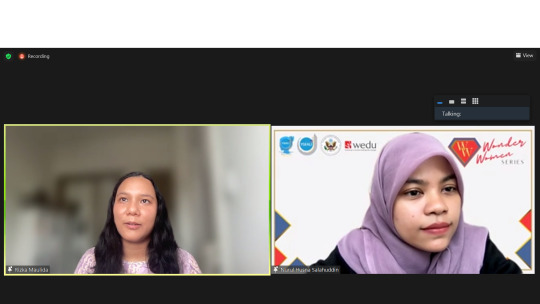
The dialogue session was moderated by a YSEALI WLA alumna, Nurul Husna Salahuddin, an Indonesian woman pursuing a Ph.D. in Technische Universitat Munchen. The event was organized by the Young Southeast Asian Leaders Initiative (YSEALI) Women Alumnae network as the second of three dialogue sessions in the Wonder Women Series. The series features prominent women figures who share their experiences and personal insights on breaking gender barriers in their chosen fields.
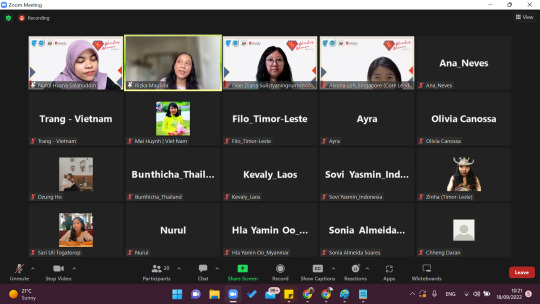
0 notes
Text
YSEALI Alumni Story: Alvona Zi Hui LOH - Singapore

“I am a young doctor from Singapore. I studied Medicine at the National University of Singapore and am doing MSc at King’s College London, Institute of Psychiatry, Psychology & Neuroscience. Currently, I am in clinical practice at a psychiatric department in Singapore.

I first became interested in mental health when I saw how members in society continue to face stigma due to various psychiatric conditions despite their talents and potential. I hope to do all in my ability to help these people find support and acceptance in society.

My journey with YSEALI started back in 2019 as a Professional Fellow and continued to 2021 when I joined the YSEALI Women’s Leadership Academy (WLA) on Public Health. At the Academy my team was awarded the small seeds grant funding for our mental health advocacy project called WEquality. The project aims to increase awareness on gender and cultural nuances in mental health issues to reduce stigma against persons with mental disorders. This project ignited a further passion in me to improve the public’s awareness on mental disorders through digital story-telling and building empathy.

My time at YSEALI never ceases to amaze me. For example, at the YSEALI WLA, women from all over Southeast Asia shared their aspirations for various parts of public health, whether in communicable diseases like COVID-19 or medical technologies. Our discussions on common themes like engaging the community and creating impact helped me see what healthcare priorities are like in other parts of SEA.
I aim to continue to learn about the diverse perspectives of healthcare from like-minded peers all over the globe. For example, I enjoy interacting with delegates who gather at the International Health Conference at Oxford University, which I have joined twice to date. I believe that discussions and interactions with others help to generate ideas, refine solutions and build a better world.”
Alvona Zi Hui LOH (Dr), Singapore 🇸🇬
2021 YSEALI Women’s Leadership Academy alumna
1 note
·
View note
Text
#YSEALIWLA Alumnae Network: Wonder Women Series — Dialogue 1: Prof. Amy Chua
Winning in life takes coming back to your values, comparative advantages and true personalities - A dialogue with Prof. Amy Chua
Over 40 participants attended an online dialogue with Professor Amy Chua, American lawyer, writer and scholar at Yale Law School last August 25, 2022.
Known and respected for her contribution in the areas of international and legal development, Professor Chua was listed as one of Time Magazine’s 100 most influential people in 2011.

During the session, Professor Chua shared her challenges as an ‘outsider’ growing up and the bias she continues to face, implicit and otherwise. To overcome them, she often returns to the values her parents instilled in her, what she calls her ‘comparative advantages’ and being true to her personality. In answer to some of the questions raised in the dialogue, Professor Chua shared anecdotes, tips and encouragement for participants to seek, if not make, their own paths.
On hard work, making tough decisions and resilience
Born in the United States, Professor Chua felt ‘a lot of high expectations’ from her immigrant ethnic Chinese-Filipino parents. She majored in Maths and chose pre-med upon entering Harvard, thinking that would make her parents happy, only to realize that, despite her hard work, she was not cut out for it. She wrestled with the option to switch, but when she finally told her parents, instead of disappointment, she was met with support.
She “fell into” economics, in which she fared much better. Getting out of the sciences was difficult, but it was ultimately a good move. However, she sensed this was still not where she could be great at.
When it was time to go to graduate school, choices narrowed further. Finally, she opted for law because everything else appeared less suitable. Yet, nothing so far had quite prepared her for the challenge.
In the US, questioning is encouraged. So when the young Amy would be called on in class, she found herself with neither opinion nor protest. Raised to be deferential towards elders and people of authority, which includes believing that the teacher is always right, a young Amy would often be at a loss and feel depressed.
Thankfully, her parents also taught her grit. Even when she felt like a failure, she strived to make the needed adjustments. Her hard work paid off. She graduated from law school and began an illustrious legal career, first practicing and then teaching before being offered tenure at Yale Law School in 2001, thus becoming its first minority female professor.
Today, not only is her course one of the most sought after at Yale, but she has published five books, some of them controversial, on matters spanning international affairs, parenting (a memoir), social studies and politics.
That is not to say that everything has been smooth sailing.
Breaking stereotypes takes courage
Although there is increased awareness, implicit bias still exists. For people trying to fight these biases, Professor Amy Chua has this advice, “Stand up for yourself. You’re stronger than you think you are.” Having said that, it is also important to find your own voice.
A mistake she made when she first started out in her career was to try to emulate the successful people around her - most of whom were white men. She would talk like them and dress in a way that showed her off as stern. The made-up persona weighed heavily on her, though. Eventually, she talked herself into acting, speaking and dressing more like her genuine self. It has helped not just in terms of bringing to the table what she was genuinely good at and uniquely positioned to bring but also inspired others to do the same.
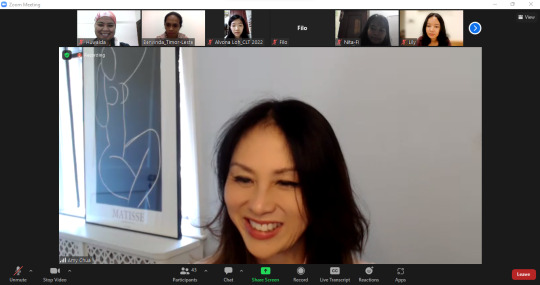
Still, even in the last few years, she feels like she sometimes attracts controversy because perhaps it is hard to imagine an Asian being successful. What her experience has taught her is that when we can stand up for ourselves, we can overcome a lot of barriers.
“It is still important to act like the people in charge but do that while being true to your own personality,” she said.
Hope for the future
In the 90s, there was a sense of internationalism, of countries coming together. There was an idea that free markets, democracy and globalization would connect us further. A big issue we are seeing now is a reverse of that trend, with people tending towards nationalism and anti-immigration, for example. People are becoming more suspicious and skeptical of outsiders. In view of that, she sees countries that have historically been in the shadows of giant economies step up and urges youths from these countries, especially women, to be involved in foreign and economic policies.
Between running classes, Professor Chua is also currently working on her first work of fiction.
Other tips from Professor Amy Chua
Find your comparative advantage - don’t just do what everyone tells you to do. If you’re not cut out for it, or you don’t like it, you’re never going to succeed in a way you can
Train yourself to be courageous
Hard work can overcome everything
Never complain; you’re never a victim
There is no easy answer when it comes to achieving balance. When you make sacrifices, choose ones that personally make sense to you. Do your best. Then, give yourself a break.
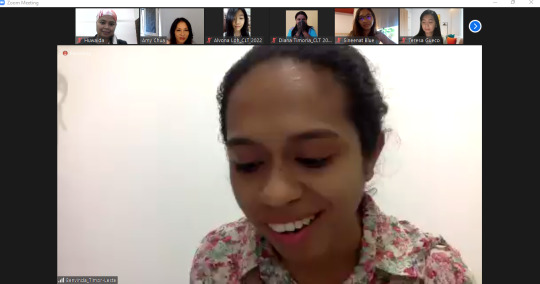
The dialogue session was moderated by YSEALI WLA alumna Benvinda Naeloi Carvalho, a lawyer and legal advisor at the Ministry of Justice in Timor-Leste.
The event was organized by the Young Southeast Asian Leaders Initiative (YSEALI) Women Alumnae network as the first of three dialogue sessions in their Wonder Women Series. The series features prominent women figures who share their experiences and personal insights on breaking gender barriers in their chosen fields.
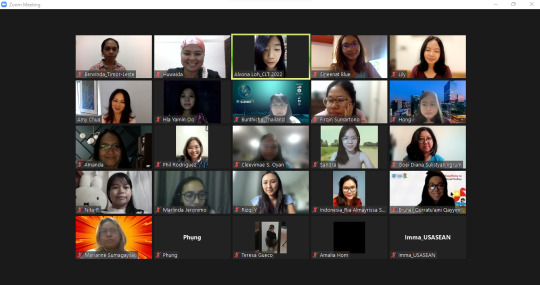
0 notes
Text
YSEALI Alumni Story: Wong Yen Jun (June) - Malaysia

“Hello! My name is June; I am a registered pharmacist and a PhD candidate majoring in Pharmacy Practice. I grew up in a small town in the state of Negeri Sembilan, worked my way to Monash University Australia, and graduated with Honours in Pharmacy. Despite multiple offers, I decided to return to my beloved Malaysia to serve my people.
As a pharmacist, I engage with patients daily. I love to converse with those who come in contact with me because every person has plenty of stories to share. Because of that, I used to volunteer in medical outreach programs to provide basic health screening and health promotion to the urban poor as well as communities in the interior of Malaysia.

These experiences led me to ponder the challenges of healthcare accessibility encountered by the underprivileged and disadvantaged communities. Thus, my PhD research explores the potential for public-private partnership in decentralizing the treatment of tuberculosis (TB), a not-so-uncommon disease, to make it more accessible to support the TB-affected communities.
What made me join the #YSEALIWLA is because I was looking to challenge myself.
I am an introvert with social anxiety. I have a fear of interacting with strangers. It sounds strange, but it takes all my energy just to order a cup of coffee from the barista. As the fear augments, my voice diminishes. This is incapacitating.
But as a woman who endeavors to improve public health services in my country, I need my voice to be heard, as my voice represents the voices of the communities I work with. With #YSEALIWLA, I was given the opportunity to:
Connect with inspiring women leaders across ASEAN and Timor-Leste;
Co-found Vita Lives with like-minded ASEAN sisters, which aims to promote nutritional health among disadvantaged children and;
Be the voice to demand structural changes for the betterment of the people.

There is much potential for Keluarga (family) ASEAN and Timor-Leste to work together for a combined synergy of our strengths. As we unite in our diversity, we are one voice and one formidable community.”

Wong Yen Jun (June), Malaysia 🇲🇾
2021 YSEALI Women’s Leadership Academy alumna
1 note
·
View note
Text
YSEALI Alumni Story: Skanthakumar Thakshayeni - Singapore

“Born in Colombo (Sri Lanka), my family moved to Singapore when I was 5, during the civil war. Through our journey of starting life alone in a foreign land, my family emerged much stronger together. I owe it all to my best friends and my parents who have been supporting me and my sisters to pursue our wildest dreams.
I completed my primary education in Cedar Primary School, O’levels at MacPherson Secondary School, A’levels at Temasek Junior College and BSc (Life Sciences) at the National University of Singapore.

Having experienced the effects of war on various social determinants of health, I had a strong desire to pursue a humanitarian health career. After 4.5 years of clinical research (oncology) experience, I graduated with a Master of Public Health from Johns Hopkins Bloomberg School of Public Health in May 2020. I am currently working at the National Centre for Infectious Diseases in Singapore, coordinating national and regional research efforts for the pandemic. I am also an Adjunct Lecturer at Singapore Polytechnic through the Singapore Red Cross Academy and an active volunteer at HealthServe and United Nations Volunteers.

I saw the 2021 #YSEALIWLA as a once-in-a-lifetime opportunity for women to be groomed as leaders at the start of their public health career.
Despite the virtual format, the Academy was intense with multiple avenues of close interactions with public health leaders in the region. The 1-1 mentorship and small seeds funding opportunity boosted my confidence in carrying out community-based health projects. Co-founding WEquality, an advocacy project on mental health, along with my fellow WLA friends, was an unexpected venture!

YSEALI members, do not miss out on this rich network that you can always tap on for collaborations! Fellow youths, take your time to find that one passionate topic, big or small. Then, remember to dedicate regular time to make that passion a reality. Passion is what fuels the positive impact you seek to make.”

Skanthakumar Thakshayeni, Singapore 🇸🇬
2021 YSEALI Women’s Leadership Academy alumna
0 notes